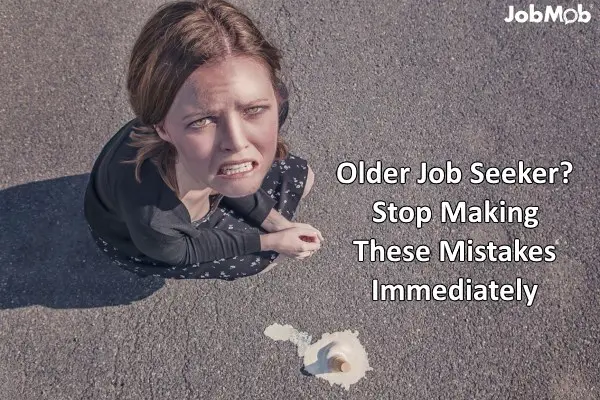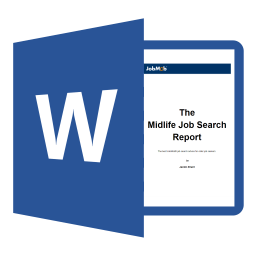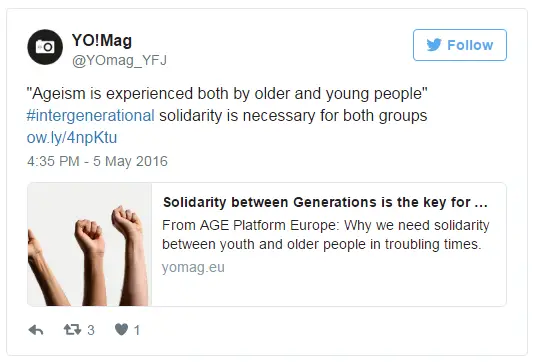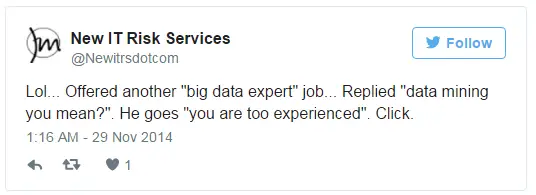5 problems that older job seekers struggle with unnecessarily.

Are you making these mistakes too?
Don’t worry! They’re all fixable.
1) Focusing on what worked in the distant past
This is normal. It just isn't helpful.
Whenever you need to do something again, it's natural to try what worked last time.
But what if your last job search was 10 years ago or more?
Job search is more Internet-oriented than ever, and the Internet changes all the time.
The longer it's been since your last job search, the less chance that what worked then is going to work now.
Free bonus: The Midlife Job Search Report is a handy guide I compiled for older job seekers. Download it now.
2) Over-emphasizing experience
In the 2013 JobMob Census, when I asked “Are there any specific topics that you'd like me to blog about?”, one of the responses was typical:
“Finding work for older job seekers, who are unemployed and have a lifetime of experience in their profession.”
In 7 Clear Signs You Should Call Yourself An Expert, I mentioned one of my favorite quotes:
“Niels Bohr famously said that “an expert is a person who has made all the mistakes that can be made in a very narrow field.” Only an expert knows how things can go wrong and how to anticipate and avoid that from happening.”
Experience (or accumulated expertise) matters but what if your experience isn't (all) relevant for the job you're applying for?
3) Using ageism as an excuse
Ageism is very real.
(So are many other forms of job search discrimination: racism, sexism, and more, such as discrimination against younger job seekers, which is technically also ageism, although not usually discussed that way).
If you feel you're suffering from ageism on your job search, it's usually your own fault.
Not the ageism itself, of course; rather, the fact that you're suffering from it.
Let it go! Easy to say, I know, but adversity is part of the job search and you can't let it affect you. What you can do is stop doing things that hurt your cause, such as emphasizing your 20 years of industry experience, and do things that help your cause, such as emphasizing the 5 years of experience in a still-relevant branch of your field.
But if you still feel you are suffering from ageism, there's a good chance that you're…
4) Applying for jobs in the wrong places
Studies show that employers hire people they want to be friends with, and wouldn't you do the same?
It makes a lot of sense when you consider how much time colleagues spend together.
With that in mind, do you really think that a few extra years of experience are going to matter more to a small company made up entirely of people 10-20 years younger than you, who are at a different stage in their careers and lives?
If their job listing explicitly requires a lot of experience, then yes! You're absolutely right to apply.
Otherwise, do yourself a favor by first researching companies who currently employ people with a similar level of experience. In other words, companies with a track record of hiring people like you. Then, only apply to them.
5) Incorrectly assessing your value and skills
Truth be told, job seekers of all ages have this problem.
But it's how they react that's different.
I can't count how many times an older job seeker said to me “I'm prepared to do anything, I just need a job.”
Can you imagine a movie poster claiming the movie is about “whatever you like”?
Would anyone see that movie?
Of course not. You see a movie because you're in the mood for something in a specific genre, whose trailer pulled you in, or a friend recommended it.
Similarly, employers consider you because they need someone with a specific skillset, whose resume clearly showed success in a related role and/or who was recommended by a credible reference.
Figure out which of your skills is most marketable, and aim for relevant positions only.
Free BonusThe Midlife Job Search Report is a handy guide I compiled to help older job seekers.
This free download contains:- 5 Common Mistakes Older Job Seekers Make
- How To Defeat Any Form of Job Search Discrimination
- How Older Job Seekers Beat These Common Stereotypes
- 9 Scary Reasons Overqualified Job Seekers are Rejected
- 40 Tips for Older Job Seekers That Actually Get Results

JobMob Insiders can get this free bonus and other exclusive content in the JobMob Insider Bonuses area. Join now, it's free!
Subscribe to JobMob via RSS or email and follow me on Twitter for more job search advice for job seekers 35 and up.






This is a really good article that confronts reality, doesn’t try to soften it.
In 20 years of recruiting I can honestly say the issue of hiring older employees is different today.
50 is the new 30!
Agree that there still is discrimination but more (most) employers now realize the value of individuals that are older.
I tell my customers, you will be lucky to keep an employee for 5 years, so why don’t you hire a stronger experienced mature individual?
Most of my customers get it.
Todd- that’s good news and thanks for bringing it to everyone’s attention. Do you think the attitude change is mainly in the US or elsewhere too?
Pingback: Job Search Article Aggregate – January 31, 2015 | David Hunt, PE
I agree with some of your comments about the “5 mistakes older job seekers make.” However, what about the older person who is trying to transition to a new career, or at least a similar career, where the skill sets are relevant? i think potential employers are skittish about taking a chance on applicants who want to try their hand at something new — say, contract management in the health care field rather than government procurement. Or, is that just another reason/excuse not to hire mature workers?
You’re right that employers are skittish in these situations, and it’s perfectly understandable- they want to be convinced without a doubt that a candidate will be successful in their open role, so an experienced candidate will usually have an edge over an inexperienced one, regardless of age. If you’re the inexperienced yet skill-qualified older candidate, it’s an extra concern that you need to account for and it might be too much to do. If it makes sense, you could propose a short-term freelance trial to show what you can do and that might be enough to convince them. Only researching the given employer up front will give you an idea of whether you should bother applying or try somewhere else. Aim to put yourself in a position of success.
Thanks that pepped me up 🙂
It is strange to think 35+ is midlife or considered an older applicant. Yes, I am over 35 back in the market for a job, it has not been fun. I need to get paid to job hunt, it is all day everyday, I am really getting a lot out of your advice. Thank you!
Glad to hear it, Lisa 😀
You’re right, it is strange to be considered when you’re not even halfway through your career, but there are many ways to play down those impressions and get over them more easily. Grab a copy of the above Midlife Job Search Report for more.
I have mixed feelings on this article. When I read it, I can tell you are younger maybe 35, and have never experienced AGEISM. If it were only so easy to “get over it”. When you follow all these suggestions, yet the recruiter or potential employer is only looking at your age – not what you can do. However, I can appreciate the points you brought out and think they are on point. Thank you.
It’s true that I wasn’t yet 40 when I blogged this and it’s also true that it’s too easy to just say “get over it”. Recruiters are not allowed to only look at your age- that’s illegal in most places- but job seekers need to be realistic about what is being thought on the hiring side of the table whether they like it or not and regardless of whether it’s right or wrong. See Tood Porter’s comment above.